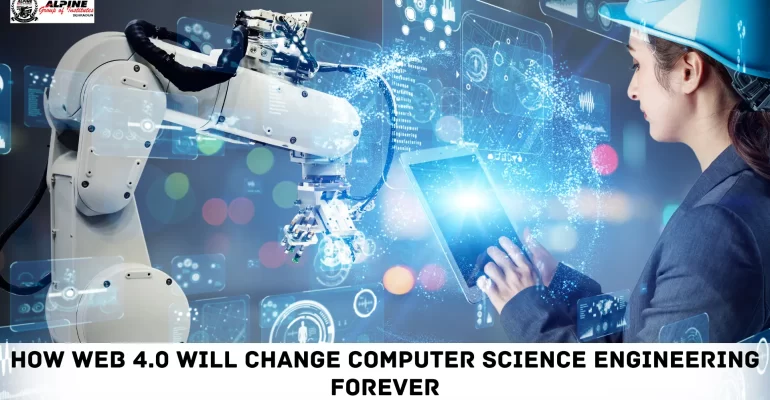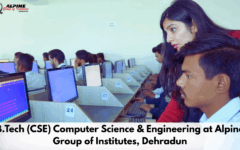How Web 4.0 Will Change Computer Science Engineering Forever
2025-04-12 7:01How Web 4.0 Will Change Computer Science Engineering Forever
The digital world is evolving rapidly, and each new phase of the web revolutionizes how we interact with technology. From the early days of Web 1.0, which offered static websites, to the more dynamic and interactive Web 2.0, the internet has undergone a significant transformation. Now, we are entering the era of Web 4.0, which promises to change the way we interact with the web, the way data is processed, and how applications and systems are built.
For Computer Science Engineering (CSE) students and professionals, the advent of Web 4.0 represents a monumental shift in their careers and education.
What is Web 4.0?
Web 4.0 is the next phase of the internet evolution, following Web 3.0, which is often referred to as the Semantic Web. While Web 3.0 focused on decentralized systems, AI, and improved user experience through smarter and more intuitive services, Web 4.0 takes things a step further. It will focus on:
- Hyperconnectivity
- Immersive experiences
- Artificial Intelligence (AI) integration
- Real-time data processing
- Blockchain technology
- Decentralized applications (DApps)
Web 4.0 will bridge the gap between the physical and digital worlds, introducing technologies like Internet of Things (IoT), augmented reality (AR), virtual reality (VR), and holographic interfaces.
How Web 4.0 Will Impact Computer Science Engineering
As Web 4.0 takes shape, it will drastically change how computer science engineers design, build, and optimize applications and systems. Here are the key areas where Web 4.0 will have the most significant impact:
1. Artificial Intelligence and Machine Learning Integration
Web 4.0 will be powered by advanced AI and machine learning (ML), enabling systems to become increasingly intelligent. CSE students will need to have a strong grasp of AI technologies, including:
- Deep Learning: Understanding how deep learning algorithms work, especially in contexts like natural language processing (NLP), computer vision, and autonomous systems.
- Reinforcement Learning: With Web 4.0’s goal of optimizing experiences based on user behavior, reinforcement learning will be crucial in real-time decision-making systems.
- Neural Networks: A key element of AI, deep neural networks will help power the real-time processing of data and interaction between the physical and digital worlds.
With these advancements, CSE engineers will need to learn how to design smarter systems that can predict, adapt, and personalize user experiences.
2. Hyperconnectivity and IoT (Internet of Things)
Web 4.0 will enable hyperconnectivity, where all devices—smartphones, wearables, appliances, vehicles—are interconnected and share real-time data seamlessly. This will require CSE professionals to understand and implement:
- IoT Architectures: Designing systems where devices can communicate with each other, store, and process data intelligently.
- Edge Computing: With the massive amount of data generated by IoT devices, CSE engineers will need to build systems that can process this data at the edge, closer to where it is generated, to reduce latency and improve efficiency.
- 5G Networks: The ultra-fast, low-latency nature of 5G technology will allow Web 4.0’s hyperconnectivity to thrive. CSE professionals will need to understand how to build applications that can leverage this new network architecture.
3. Decentralization and Blockchain Technology
Web 4.0 will push the concept of decentralization to new heights. Blockchain technology will be at the heart of this, enabling secure, transparent, and decentralized transactions. CSE students will need to focus on:
- Smart Contracts: Web 4.0 will utilize blockchain for more than just cryptocurrency. Smart contracts will automate processes and create decentralized apps (DApps).
- Cryptography and Security: As decentralized networks increase, ensuring data privacy and security will be critical. Engineers will need to understand advanced cryptography techniques to secure transactions and sensitive information.
- Decentralized Finance (DeFi): With blockchain taking center stage in finance, CSE students will also need to explore new fields like DeFi, which offers decentralized financial services without intermediaries.
4. Immersive Technologies: AR, VR, and Holography
Immersive experiences will be a hallmark of Web 4.0, with augmented reality (AR), virtual reality (VR), and holographic technologies transforming how we interact with digital content. CSE engineers will need to learn:
- AR and VR Development: Understanding how to create immersive virtual environments and experiences that interact with the physical world in real-time.
- 3D Modeling and Simulation: Building realistic 3D environments for VR and AR requires knowledge of graphics programming and real-time rendering technologies.
- Holographic Computing: As holographic displays become more feasible, engineers will need to understand the hardware and software needed to create these experiences.
5. Real-Time Data Processing
Web 4.0 will require real-time data processing and interaction, particularly in applications such as autonomous systems, IoT, and smart cities. CSE students will need to focus on:
- Real-Time Databases: Implementing databases that can handle vast amounts of data and deliver results in real time.
- Streaming Data Processing: Building systems that can process data as it arrives, such as through Apache Kafka or Apache Flink.
- Big Data Analytics: Understanding how to process and analyze large datasets quickly to enable real-time decision-making.
Skills CSE Students Will Need for Web 4.0
As Web 4.0 continues to develop, CSE students need to equip themselves with specific skills to stay competitive in the field. Here are some of the essential skills they should focus on:
1. Advanced AI/ML Skills
Understanding the latest AI and machine learning algorithms is paramount. Students should focus on learning:
- Neural Networks and Deep Learning
- Natural Language Processing (NLP)
- Reinforcement Learning
- AI Ethics and Privacy
2. Blockchain and Cryptography
The future of Web 4.0 will heavily depend on secure, decentralized systems. Skills in:
- Blockchain Development and Smart Contracts
- Cryptography and Security Protocols
3. AR/VR Development
With immersive technologies becoming a core aspect of Web 4.0, students should master:
- AR/VR Programming
- 3D Modeling and Simulation
- Game Engines like Unity or Unreal Engine for creating immersive applications
4. Data Science and Real-Time Analytics
Data is the lifeblood of Web 4.0. CSE students should develop skills in:
- Big Data Technologies like Apache Hadoop and Apache Spark
- Real-Time Analytics with tools like Apache Kafka
- Data Visualization
5. Cloud Computing and Edge Computing
As more computing power shifts to the cloud and edge, students should understand:
- Cloud Platforms like AWS, Google Cloud, or Microsoft Azure
- Edge Computing Architectures
The Future of Computer Science Engineering in Web 4.0
As Web 4.0 unfolds, the role of computer science engineers will only grow in significance. They will be at the heart of building intelligent systems, ensuring data security, creating immersive experiences, and integrating blockchain for decentralized applications.
For CSE students, this represents an incredible opportunity. Those who embrace emerging technologies, stay ahead of trends, and focus on gaining expertise in AI, blockchain, immersive tech, and data analytics will be well-positioned to lead in the Web 4.0 era.
Conclusion
The rise of Web 4.0 will undoubtedly transform the digital landscape, pushing the boundaries of what we can achieve with technology. For Computer Science Engineering students, this evolution offers a chance to be part of groundbreaking changes in AI, decentralization, IoT, and immersive computing. By developing the necessary skills and staying updated with the latest trends, they can ensure their careers thrive in this new era.
FAQs
1. What is the primary difference between Web 3.0 and Web 4.0?
Web 3.0 focused on the semantic web and decentralization, while Web 4.0 will introduce hyperconnectivity, immersive experiences, real-time data processing, and deeper AI integration.
2. How can CSE students prepare for Web 4.0?
Students should focus on mastering skills in AI, blockchain, AR/VR development, real-time data analytics, and cloud computing. Online courses, certifications, and hands-on projects will help.
3. Will Web 4.0 replace traditional web development?
Web 4.0 will enhance and evolve current web technologies, introducing new concepts and methods of interaction, rather than replacing traditional web development entirely.
By embracing the technologies and skills that Web 4.0 brings, CSE students can play a significant role in shaping the future of the digital world.









